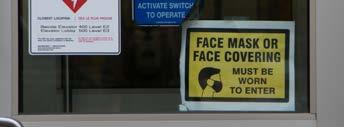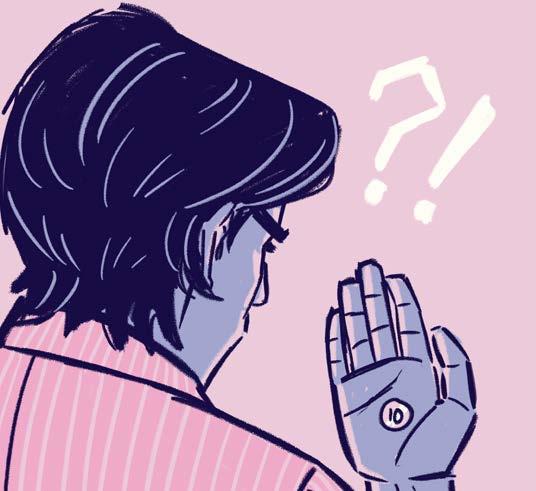
9 minute read
News pages 3 to
The ethics of Manitoba’s targeted restrictions
Ethicist explains restrictions are ethically necessary under Canada’s charter
FEATURE
Dimitar Tomovski, staff The Manitoba government announced new COVID-19 restrictions on Oct. 5 that specifically target those that have not yet been vaccinated against COVID-19.
The restrictions limit indoor private gatherings to guests from one other household whenever an unvaccinated person who is eligible to receive the vaccine is present. This includes unvaccinated people living in the household.
Similar restrictions exist for private outdoor gatherings, indoor public gatherings and faith-based gatherings. Philosophy professor Arthur Schafer — founding director of the Centre for Professional and Applied Ethics at the U of M — observed some of the opposition to instating restrictions targeting the unvaccinated claims it creates a two-tier society and that the restrictions are discriminatory.
“I don’t find that a plausible argument because the distinction [is that] the people who are targeted by these restrictions chose not to be vaccinated,” said Schafer. Schafer said under Canada’s Charter of Rights and Freedoms, Canadians are allowed to live their lives according to their own values and preferences without coercive interference of others. However, there are instances where restrictions are reasonably necessary.
To paraphrase John Stuart Mill, “Your freedom to wave your fist around in the air stops when it gets in the vicinity of my nose,” Schafer said.
“You don’t have the liberty to act in such a way as to endanger other people’s liberty.”
When it comes to targeted restrictions, Schafer explained, the safety benefits must outweigh the harm of the restrictions.
“What ethicists say, is that if your actions are likely to cause serious harm to others or society […] and if it’s necessary in order to protect others and protect society to restrict [your] liberties […] and if the good it’s likely to produce outweighs the harm, then the restriction is legally justifiable and ethicists would say morally justifiable,” Schafer said.
Schafer believes anyone who challenges pandemic restrictions in court will be met with the claim that the restrictions are necessary and justifiable in a free and democratic society. Schafer assumes the restrictions imposed on the unvaccinated are the minimum required.
“I think it’s right, reasonably, to accommodate people who are unvaccinated,” he noted.
“But the special restrictions that are targeted at the unvaccinated aren’t unfair if they’re reasonably necessary to protect others.”
Schafer drew a distinction between excluding people on the basis of vaccination status and exclusions that
/ staff Basel Abdelaziz photo /
warrant legitimate ethical concern.
“If someone is excluded from a gym because of their race or their religion or their age or their ethnicity, that’s arbitrary and unfair,” he stated.
“If they’re excluded from the gym […] on the grounds that they pose a health danger to the other fully vaccinated people who are attending or, more importantly, if they pose a danger to the sustainability to our healthcare system with potentially dire consequences, then it doesn’t pass as a regulation that restricts access and thereby minimize the effects of the pandemic on society would be reasonable.”
features@themanitoban.com
Faculty authorize strike vote
Cont’d from front page
NEWS
Cam Cannon, staff “A ‘yes’ vote doesn’t necessarily mean there will be a strike,” read the document.
“A strong vote on its own might see the administration start to take bargaining seriously, where up until now they’ve made no significant moves at the bargaining table.”
In the event of a strike, faculty will cease all “teaching, supervision, advising, library, service and administrative duties,” with members expected to contribute job action at least three hours per day from Monday to Friday if they wish to receive strike benefits.
These benefits amount to $200 per shift.
Those on research and study leave will not be affected by job action and will be able to continue to perform their duties.
Provincial interference woes resurface
Wages for faculty have effectively been frozen since the passage of the 2017 Public Services Sustainability Act. Although the legislation was struck down by courts, the provincial government launched an appeal to the decision in January of this year.
During negotiations last year, it was revealed that the provincial government had mandated no salary increases for the 2020-21 academic year occur.
At a U of M senate meeting Oct. 6, U of M president Michael Benarroch stated this year there is another mandate from the province to cap salary increases at 0.75 per cent for two years and 1 per cent in the final year.
“This provincial government needs to stop interfering in negotiations,” said UMFA president Orvie Dingwall in a press release.
“And we need the university to come to the bargaining table with a reasonable salary offer so we can negotiate a fair deal.”
Other professors and unionists offered their thoughts on the state of the current labour dispute on Twitter.
“Most people would be surprised by what a small proportion of the university budget is made up by faculty salaries,” said Manitoba Organization of Faculty Associations president Scott Forbes in a tweet Oct. 8. “Salaries of the admin infrastructure are larger & grow larger year by year. Professors are becoming almost an afterthought.”
Dingwall has previously indicated that in addition to salary, faculty are also concerned about what they view as infringements on their academic freedom, with the university pushing for measures which would require faculty members engaging in outside activity to clear it with their respective deans first.
Students organizing in support of faculty
School of Fine Art Student Association representative on the UMSU board of directors Travis Hunnie said that he and other students are “preemptively” organizing in support of faculty as part of a small organization called Students Supporting UMFA.
“We recognize the struggle that the faculty association is going through right now in their labour dispute,” he said.
“We want to stand in solidarity with them.”
The purpose of the group is to have a centralized organization to tackle larger pro-UMFA campaigns. “Our faculty wants what is best for the students and the administration knows that, which is why they continue to take advantage of them,” he said in an emailed follow-up statement.
“The voices of students are important in this struggle, and if we feel strongly that UMFA isn’t getting a fair deal, we need to make that known. Spread the word, make it public and tell the administration directly that this is not okay.”
Those wishing to participate in student organization supporting UMFA can reach out to standwithumfa@gmail.com.
UMSU president Brendan Scott said at the Oct. 7 board of directors meeting that the place to find unbiased information about the ongoing negotiations is the university’s website.
Detailed information can also be found on the union’s website.
The UMSU board of directors is expected to receive presentations from representatives of the university and UMFA later this month.
Kinesiology researcher analyzing Jets fan psychology
Obsessive or harmonious: what kind of Jets fan are you?
RESEARCH & TECHNOLOGY
Michael Campbell, staff Ben Schellenberg, assistant professor in the faculty of kinesiology and recreation management, has launched a study into the experiences of Jets fans. The study consists of a survey where Jets fans are asked questions about how hockey influences their social life and feelings of harmony, as well as charting their obsession at three points in the season — pre-season, mid-season and end-of-season.
/ staff Basel Abdelaziz photo /
Schellenberg has experience conducting research at the intersections of psychology and kinesiology. Specifically, he has an interest in social psychology and its applications to both athletes and sports fans.
Schellenberg hopes to test the data he is collecting against a couple of general models of motivation. One of the models that Schellenberg will use to assess the data is the dualistic model of passion, which posits that passion is demonstrated in activities that allow people to define themselves. Within this model, passion develops into either harmonious or obsessive passion. Obsessive passion occurs when one feels surrendered to the activity, whereas the fan remains in control when experiencing harmonious passion.
Schellenberg also hopes to apply the team identification-social psychological health model to the data. In this model, team identification leads to the creation of social connections and an improved sense of well-being. This sense of well-being can reinforce one’s desire to identify as a fan.
“A big part of [being] sports fans, especially those who are highly identified, is that being a fan of a team, that becomes part of your identity,” Schellenberg said.
“It becomes part of who you are.”
This is especially true in Winnipeg. Since the return of the Jets to Winnipeg in 2011, fans have demonstrated their devotion through traditions like whiteouts, yelling “True North” during the national anthem and pouring out in the street for playoff appearances.
“I think being in Winnipeg is the perfect place to study sports fans,” Schellenberg said.
“I think this is a fantastic area because there’s so many people who are fans of one team — the Jets.”

Because Schellenberg is studying only one team, it is possible to analyze how the team’s on-ice performance over the course of the year may affect fans’ passion for them. points, some fans might be more even throughout their experiences — high or low — whereas other fans might be more reactive to how the Jets are doing at that moment,” Schellenberg said.
Schellenberg speculated suspending sports during the pandemic restricted fans’ ability to connect with others in their established and ritualized way.
He also found passion type could be an indicator for coping strategies during the pandemic sports shutdowns. Schellenberg studied the effect of the NBA’s shutdown in March 2020 on harmonious and obsessive fans.
“The more obsessed these fans were, the more distressed they were during the period of time when the NBA was suspended due to the pandemic,” he said. cope with the fact that their favourite sport is no longer being played, whereas the harmonious passionate fans were doing much better.”
Sports unite Canadians from all walks of life. People seem almost as interested in understanding the phenomenon of sports fans as they are in watching their favourite teams.
Schellenberg said he is surprised by the media attention that this study is receiving.
“I do research with athletes [and] students,” Schellenberg said.
“[But] the media have only contacted me about my research that we’ve done with sports fans.”
— Ben Schellenberg, assistant professor
The Winnipeg Free Press published an article on the study in September. CBC Radio’s Up To Speed with Faith Fundal also interviewed Schellenberg. “The media attention with this specific study is just sort of reinforcing this sort of idea that I’ve been having that people are really interested in research of sports fans,” Schellenberg said.“So that’s sort of giving me some more motivation to continue.”
The media attention is due in part to the fact that fandom seems to defy logic. Die-hard fans support their team regardless of the outcome.
“A couple of times I’ve been contacted by media outlets in Toronto asking me, you know, ‘Why are these [Toronto] Maple Leafs fans […] still Maple Leafs fans?’” Schellenberg said.
“‘Year after year, they’re disappointed, but they’re still Maple Leafs fans.’”





